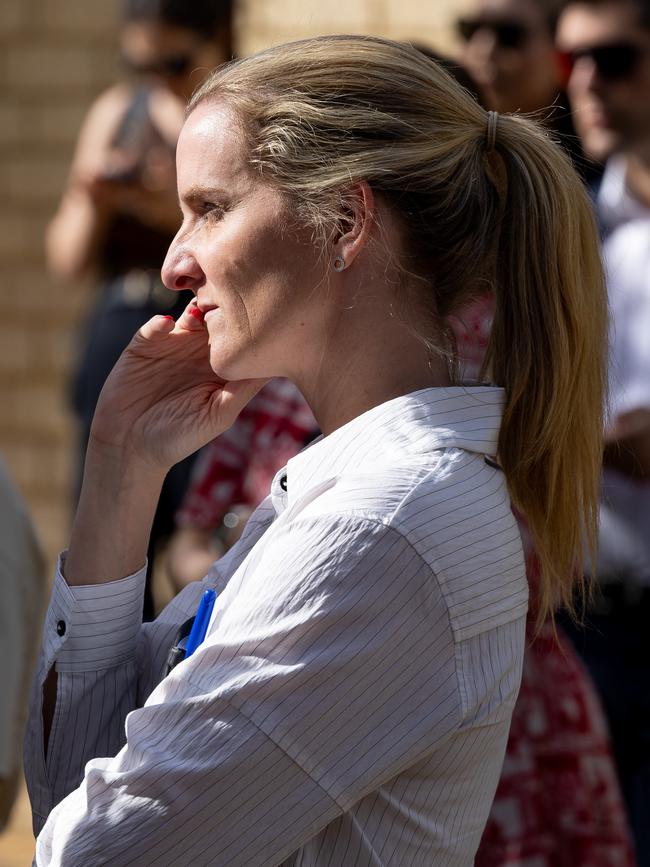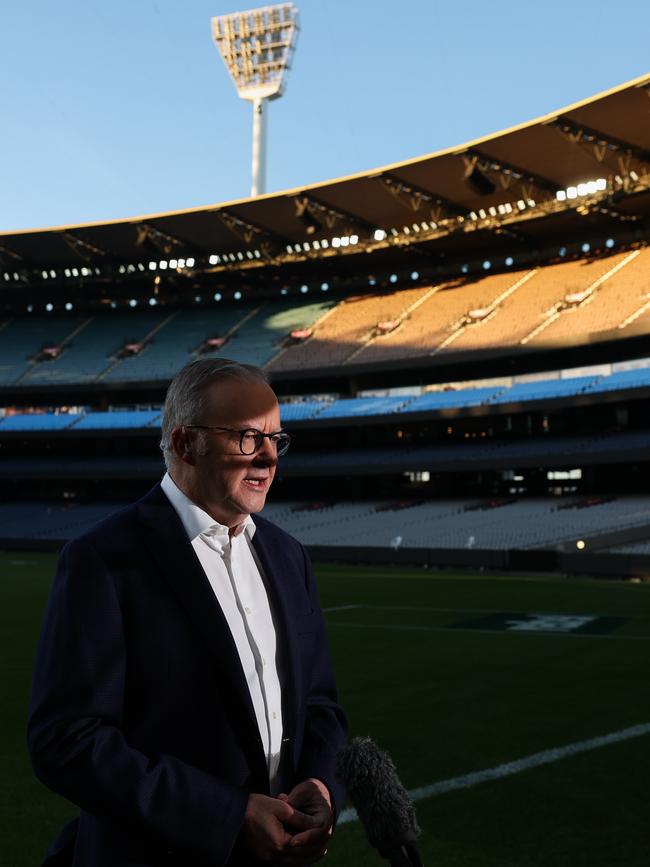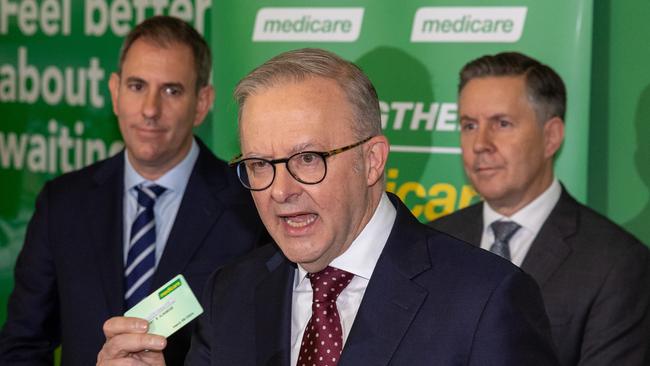How Labor capitalised on Australians’ fear Peter Dutton was not ‘competent’ to win the election
The key insiders and strategies behind how Anthony Albanese went from the brink of electoral defeat to historic victory.
Federal Election
Don't miss out on the headlines from Federal Election. Followed categories will be added to My News.
Four hours before voting closed Anthony Albanese was travelling to his final stop of the campaign – a polling booth in the Sydney electorate of Reid – when his phone lit up with a good luck text from Greg Inglis.
A Rabbitohs tragic, the Prime Minister grinned as he read the brief message from the NRL great, before turning his attention back to the gaggle of journalists prodding him for insights from the preceding five weeks.
Not for the first time during the campaign, Albanese had decided to hop on to the media bus usually left to trail behind the prime ministerial “C1” vehicle.
Despite every published poll now showing he was running away with the election, Albanese refused to be drawn into getting ahead of himself.
His coy responses didn’t really matter though as his relaxed and jovial manner might as well have been a neon flashing sign reading, “I’ve got this”.
Albanese had just had the campaign run of dreams, a disciplined five-week sprint around the country where he had stayed largely on message and gaffe-free.
At the same time his opponent had imploded amid a combination of poor planning, strategy, unforced errors and the pressure of relentlessly negative messaging orchestrated by a ruthlessly effective Labor Party machine.
But as the travel-weary media pack lightheartedly debated the merits of various NRL hall-of-famers, neither they, or the PM and his inner circle of senior colleagues, advisers and party officials, had any inkling just how seismic the victory awaiting Labor would be.

As it turned out, on May 3 Albanese launched himself into the history books, easily surpassing Bob Hawke’s record 86 seat election victory in 1987.
But the highest of highs came just six months after Albanese had hit rock bottom.
In November, Labor had fallen behind the Coalition 49 to 51 on a two-party preferred basis in Newspoll, while voters viewed Albanese less favourably than Peter Dutton.
Heading into Christmas, Albanese’s colleagues were anxious at the prospect of becoming the first-term government to lose office since the Great Depression.
It was a “break-glass” moment for the team around Albanese, who used a brief two-week period of down time around Christmas to develop a comeback strategy.
Earlier in 2024, Albanese had made key personnel changes, hiring David Epstein as his principal private secretary and Fiona Sugden as his communications director – two highly experienced operatives who had worked for Kevin Rudd among other Labor leaders.
While Epstein got to work with strategies to address the government’s more prickly policy and political problems, Sugden turned her attention to building up a press office that was less reactionary and more forward looking.


At the same time ALP national secretary Paul Erickson and his team were conducting research and testing messages.
Much like the Liberal strategists, Erickson had found there were a lot of Australians upset after three years of cost of living pressures, who were “disappointed” in Albanese and “prepared to look at the alternative”.
His strategy was to build a much larger constituency of voters who might appreciate that in tough global circumstances, Labor had done an OK job, was focused on the issues Australians cared about and in an uncertain world, Albanese was a steady and careful leader.
The government developed policies specifically designed to remind Australians what Labor had already done, and build on that.
At a November rally in the South Australian Liberal-held electorate of Sturt, Albanese announced Labor would make fee-free TAFE permanent and slash 20 per cent off all student HECS debts.
In December at an event in the Queensland electorate of Griffith, held by the Greens, the PM revealed Labor would scrap the activity test and guarantee all children access to three days of subsidised childcare.
In March Albanese stood on stage in the Tasmanian Liberal-held electorate of Bass to unveil Labor’s $8.5 billion commitment to Medicare to triple the GP bulk billing incentive.
On May 3, Labor resoundingly won all three seats.

But back in December, this was far from assured.
Those close to Albanese are quick to emphasise there was no “intervention” so much as a “refocusing” around a strategy the PM was very much on board with.
Though more than one conceded Albanese is sometimes better at taking on advice and acknowledging he needs help in the moments where things are “really not going well”.
Poor presentation, a lack of detail and combative interactions with journalists had become a hallmark of Albanese’s press conferences over three years – rough edges that had to be smoothed in the very least.
The plan was to undertake a dry run – a short stint from Queensland through the Northern Territory and Western Australia with a string of local infrastructure and housing announcements accompanied by a small travelling media pack.
Many of the places visited during the campaign were similar if not the same as those the PM had travelled earlier in the term, which served to take some of the stressors out of each stop that naturally arise from being in an unfamiliar location.
The election schedule was meticulously planned, right down to the PM’s decision to step out onto the hallowed turf of the Melbourne Cricket Ground as the sun rose on the final day of the campaign – a vision Albanese had in his mind weeks earlier.
“I enjoy it,” the PM had said of being on the road during his final press conference of the campaign.

It was a far cry from the Albanese of 2022, who’s confidence had been shot by critical gaffes early in that campaign.
This time as the PM set a gruelling pace around the country, he was backed up by a rotating cavalry of senior colleagues, with Health Minister Mark Butler – a close ally and friend of Mr Albanese’s – on the road more than any other.
Finance Minister Katy Gallagher and Deputy Prime Minister Richard Marles were also frequent travellers with Albanese, while Foreign Minister Penny Wong and Treasurer Jim Chalmers also appeared at key moments during the campaign.
In addition to providing morale boosts, political and policy support, this rotating cast of characters served to advertise the depth of Labor’s frontbench as a stark contrast to the often solo Dutton.
Far from the glare of mainstream media cameras, Labor was also courting podcasters and content creators many of whom were engaged through the company Diamantina Media, which is co-owned by the founders of the satirical news publication Betoota Advocate.
Albanese did a live stream for the hugely popular British politics show, The Rest Is Politics, appeared on It’s A Lot with Abbie Chatfield, and chatted over a beer with YouTuber Ozzy Man Reviews, real name Ethan Marrell who revealed he scored an interview with the PM simply by commenting on his Instagram page.
While the PM was fronting a positive election agenda, a well-resourced and efficient Labor apparatuses had swung into gear with a barrage of negative messages about the Opposition leader.
Erickson’s research had identified the Coalition’s nuclear plan as a vote blocker for many Australians, with economic considerations among the biggest concerns.
Since October last year, Labor hammered away at the idea Dutton would have to make cuts to pay for the Coalition’s nuclear plan, and after several months found voters were nodding along.
The Liberals point to the success of this “false” messaging as a key factor in their loss.

Unsurprisingly Labor strategists reject the suggestion its tying of Medicare cuts to paying for nuclear was a “scare campaign”.
They argue Dutton’s record as health minister after having promised not to cut services before the 2013 election made it fair fame to speculate about his potential to do so again.
And Australians didn’t need much convincing.
One insider described the reaction from focus groups when it was suggested Dutton would come after things they valued, such as Medicare, as like “pushing on an open door”.
Labor had first established the potency of messaging around Dutton’s track record on health two years ago during the by-election in the outer Melbourne suburb of Aston.
The approach taken in that historic win – in which a sitting government flipped a seat in their favour for the first time – also helped Labor cling on to the Melbourne seat of Dunkley in early 2024 when Albanese was far more on the nose with voters after the disastrous Voice referendum.
But by mid last year Labor strategists began to fear Dutton had largely overcome the public’s weariness of his intentions after the opposition leader proved himself a man of action with a bold plan to bring nuclear power to Australia.
Tying nuclear to other cuts helped, but it was the Coalition’s thin policy offering compounded by Dutton’s lacklustre early campaign performances that ultimately prompted voters’ “doubts” about him to return to the surface, according to Labor’s research.
Labor started its track poll the Thursday night before Albanese called the election and got the first promising report a few days later.

Over the course of the next week, as Albanese was announcing a plan to make price gouging illegal and selling Labor’s surprise tax cuts, that track poll “blew out to a huge lead,” says a Labor insider.
A few days later, Dutton announced he was dumping his unpopular policy to force Canberra public servants back into the office.
With this policy reversal, Dutton lost the perception he was “competent” and from there his standing with voters “never recovered”.
Even though everything had gone right for Labor, and the party was confident it was on track to pick up seats in northern Tasmania, Queensland and Adelaide, no one was expecting the bloodbath voters ultimately visited upon the Liberals.
This was in part due to the fact campaign resources were entirely focused on target marginal seats they hoped to win, and they simply weren’t polling unexpected gains like Hughes in NSW, Petrie in Queensland or Moore in Western Australia.
A best case seat result was thought to be somewhere over 80, instead Labor is at 90 and counting.
It’s a number unfathomable to the Albanese who was happily bumping along the road on the media bus in Sydney on election day.
The scale of the party’s success would not be fully realised until election night.
In his victory speech on Saturday night, Albanese praised Erickson as a “magnificent campaign director”.
More Coverage
Originally published as How Labor capitalised on Australians’ fear Peter Dutton was not ‘competent’ to win the election





